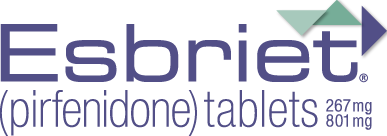
Side Effect Reporting
Report side effects to the FDA at (800) FDA-1088 or www.fda.gov/medwatch.
You may also report side effects or harmful experiences to Genentech at (888) 835-2555 or here.
On February 6, 2025, Legacy Pharma Inc. SEZC (“Legacy Pharma”), signed an agreement with Genentech, a member of the Roche Group, to acquire the rights to Esbriet® (pirfenidone) in the United States. Under the terms of the agreement, Legacy Pharma will receive product rights for Esbriet® in the United States.
Beginning November 3, 2025, please direct any clinical product questions to Legacy Pharma, by phone at 1-866-930-0188, or by email at [email protected].
Who should I contact if I have side effect concerns or have an adverse event to report on the product?
Beginning November 3, 2025, you may contact Legacy Pharma, by phone at 1-800-727-7151, or by email: [email protected] if you have side effect concerns or you would like to report an adverse event. You may also report side effects to the FDA at 1-800-FDA-1088 or www.fda.gov/medwatch.